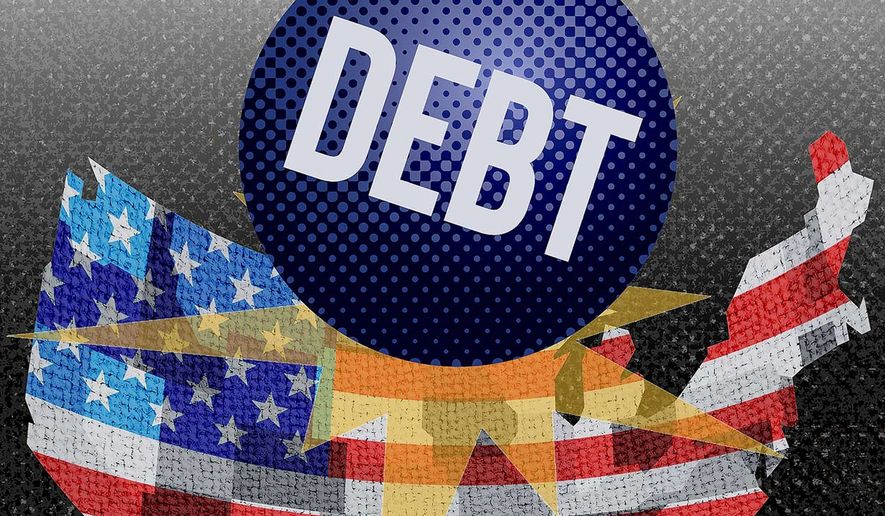OPINION:
Last Thursday, Federal Reserve Chairman Jerome Powell appeared before the Senate Banking Committee to discuss what he and his colleagues are doing about the persistent inflation plaguing the economy. As expected, Mr. Powell acknowledged that interest rates are on the rise and hoped they would not lead to a significant increase in unemployment as the economy slows.
Mr. Powell knows that history suggests otherwise. Inflation, once out of its cage, is not easy or painless to tame. As everyone’s junk mail shows, prognosticators and financial gurus gobble this up and spoon-feed it to their clients.
But Mr. Powell’s observations on the long-term prospects for an economy beset by skyrocketing spending and debt ought to alarm Congress, the media, the public and even the White House. Wyoming Republican Sen. Cynthia Lummis asked Mr. Powell if he is concerned about the impact of rising interest rates on the government’s ability to manage a national debt that represents more than 120% of the nation’s gross domestic product.
Mr. Powell’s answer was direct enough. He said no, and he advised or reminded the senator that any problems the government has in making increased interest payments of the debt aren’t his problem. Besides, he continued, “The path we’re on is not sustainable, but the level of debt that we have is sustainable.”
Clearly concerned, the senator asked again. Mr. Powell reiterated his belief that the current debt is manageable but added a warning that too many missed:
“Yes. Clearly, we have the largest economy in the world. We can service this debt. That’s not the problem. The problem is that we’re on a path where the debt is growing substantially faster than the economy. That’s by definition, in the long run, unsustainable. The way countries have fixed that is with longer-term programs that have bipartisan support that address the actual problem in the budget.”
With those words, the Federal Reserve chairman was warning Congress and the administration that we’ve got a problem, and they are the ones who should be dealing with it. He was clear enough; if they stop the profligate spending now, we can still manage to make payments on the debt we have run up. If we keep adding to the debt, the time will come when the chickens will “definitionally” come home to roost.
Carrying the existing debt may be manageable, but as it increases it will become increasingly painful and eventually unmanageable.
These words were meant to be reassuring, but most Democrats and Republicans, along with the president of the United States, have no real desire to do much to reduce or halt skyrocketing spending. These remarks should be taken as a warning that the good times may end very soon.
To understand the problem, compare the debt to a home mortgage. As interest rates climb, a homeowner with a variable-rate mortgage finds it more and more difficult to make monthly payments. At some point, the homeowner’s income is insufficient to pay, and the bank forecloses. The national debt is a huge variable-rate mortgage that is “sustainable” only if tax revenue from a vibrant economy is sufficient to cover the payments. The Biden administration suggests we can solve the problem by taxing “the rich” without reducing economic growth. Neither Republicans nor Democrats seem willing to tackle spending.
Like the homeowner who ignores a growing inability to make mortgage payments rather than cut back on other spending, Congress and the White House are looking the other way as if there will never be a reckoning. Republicans in Congress — at least some of them — may talk about reducing spending, but as Buddy Holly sang, “That’ll Be the Day.”
They at least pretend to be concerned while the president and congressional Democrats are united in their determination to refuse to even consider reducing spending or adopting institutional reforms that might force cuts. That’s what their demand for a “clean” increase in the debt limit is all about, an increase that Mr. Powell inconsistently insists is needed even as he warned about runaway the consequences of doing nothing.
In the 1990s, the Senate came close to passing a constitutional amendment requiring a balanced budget. When it came to a vote on the floor, the budget was balanced for the first time in a decade. Illinois Democratic Sen. Paul Simon warned his colleagues that if they didn’t pass it, none of them would believe the deficits that lay in the future.
They didn’t, Simon was right, and the future is here.
• David Keene is editor-at-large at The Washington Times.




Please read our comment policy before commenting.